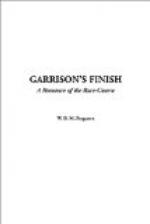“It’s this way,” began Crimmins, once the shelter of the pike was gained. “I’m Billy Crimmins’ brother—the chap who trains for Major Calvert. Now, I was down an’ out—I guess you know why—an’ so I wrote him askin’ for a little help. An’ he wouldn’t give it. He’s what you might call a lovin’, confidin’, tender young brother. But he mentioned in his letter that Bob Waterbury was here, and he asked why I had left his service. Some things don’t get into the papers down here, an’ it’s just as well. You know why I left Waterbury. Waterbury——!”
Here Crimmins carefully selected a variety of adjectives with which to decorate the turfman. He also spoke freely about the other’s ancestors, and concluded with voicing certain dark convictions regarding Mr. Waterbury’s future.
Garrison listened blankly. “What’s all this to me?” he asked sharply. “I don’t know you nor Mr. Waterbury.”
“Hell you don’t!” rapped out Crimmins. “Quit that game. I may have done things against you, but I’ve paid for them. You can’t touch me on that count, but I can touch you, for I know you ain’t the major’s nephew—no more than the Sheik of Umpooba. I’m ashamed of you. Tryin’ on a game like that with your old trainer, who knows you—”
Garrison caught him fiercely by the arm. His old trainer! Then he was Billy Garrison. Memory was fighting furiously. He was on fire. “Billy Garrison, Billy Garrison, Billy Garrison,” he repeated over and over, shaking Crimmins like a reed. “Go on, go on, go on,” he panted. “Tell me what you know about me. Go on, go on. Am I Garrison? Am I? Am I?”
Then, holding the other as in a vise, the thoughts that had been writhing in his mind for so long came hurtling forth. At last here was some one who knew him. His old trainer. What better friend could he need?
He panted in his frenzy. The words came tripping over one another, smothering, choking. And Crimmins with set face listened; listened as Garrison went over past events; events since that memorable morning he had awakened in the hospital with the world a blank and the past a blur. He told all—all; like a little child babbling at his mother’s knee.
“Why did I leave the track? Why? Why?” he finished in a whirlwind of passion. “What happened? Tell me. Say I’m honest. Say it, Crimmins; say it. Help me to get back. I can ride—ride like glory. I’ll win for you—anything. Anything to get me out of this hell of deceit, nonentity namelessness. Help me to square myself. I’ll make a name nobody’ll be ashamed of—” His words faded away. Passion left him weak and quivering.
Crimmins judicially cleared his throat. There was a queer light in his eyes.
“It ain’t Dan Crimmins’ way to go back on a friend,” he began, laying a hand on Garrison’s shoulder. “You don’t remember nothing, all on account of that bingle you got on the head. But it was Crimmins that made you, Bud. Sweated over you like a father. It was Crimmins who got you out of many a tight place, when you wouldn’t listen to his advice. I ain’t saying it wasn’t right to skip out after you’d thrown every race and the Carter; after poisoning Sis—”




